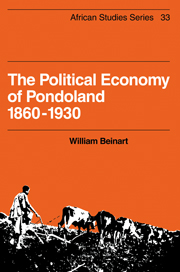Book contents
- Frontmatter
- Contents
- List of maps
- Preface
- Abbreviations
- Introduction
- 1 The political economy of Pondoland in the nineteenth century
- 2 Crops, cattle and the origins of labour migrancy, 1894–1911
- 3 Rural production and the South African state, 1911–1930
- 4 Chiefs and headmen in Pondoland, 1905–1930
- 5 Rural differentiation, alliance and conflict, 1910–1930
- Postscript
- Tables
- Notes
- Select bibliography
- Index
- BOOKS IN THIS SERIES
- Frontmatter
- Contents
- List of maps
- Preface
- Abbreviations
- Introduction
- 1 The political economy of Pondoland in the nineteenth century
- 2 Crops, cattle and the origins of labour migrancy, 1894–1911
- 3 Rural production and the South African state, 1911–1930
- 4 Chiefs and headmen in Pondoland, 1905–1930
- 5 Rural differentiation, alliance and conflict, 1910–1930
- Postscript
- Tables
- Notes
- Select bibliography
- Index
- BOOKS IN THIS SERIES
Summary
My interest in Pondoland was initially stimulated by an event which is not addressed at all in this book: the revolt of 1960. None of the studies dealing with the emergence of mass nationalist movements in South Africa after the Second World War seemed to have come to terms with the links between urban-based action and the series of rural rebellions which spread through the countryside, and particularly the African ‘reserves’, in the 1950s. Pondoland, the scene of one of the most significant and sustained popular movements, was clearly an important vantage point from which to analyse such issues. I soon became convinced, however, that the revolts could not be explained merely by reference to the broader nationalist movements nor by the specific state policies, land rehabilitation and the ‘Bantu Authorities’ which triggered them off. Ultimately, an understanding of the position in the African reserves had to be located in an analysis of the way in which formerly independent African chiefdoms had been transformed by the development of industrial capitalism in South Africa.
The problems raised in this exercise soon became central to the project, and the focus for research moved to the early colonial and even pre-colonial periods. Discussion of the process of colonisation in Pondoland seemed particularly important, for its people had what may be considered an atypical experience: it was one of the last annexed areas of South Africa, it was not conquered by force of arms, and little land was taken for white settlement.
- Type
- Chapter
- Information
- The Political Economy of Pondoland 1860–1930 , pp. vii - ixPublisher: Cambridge University PressPrint publication year: 1982

